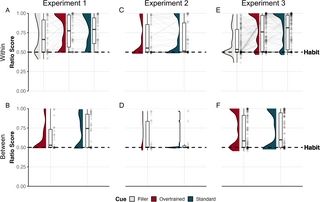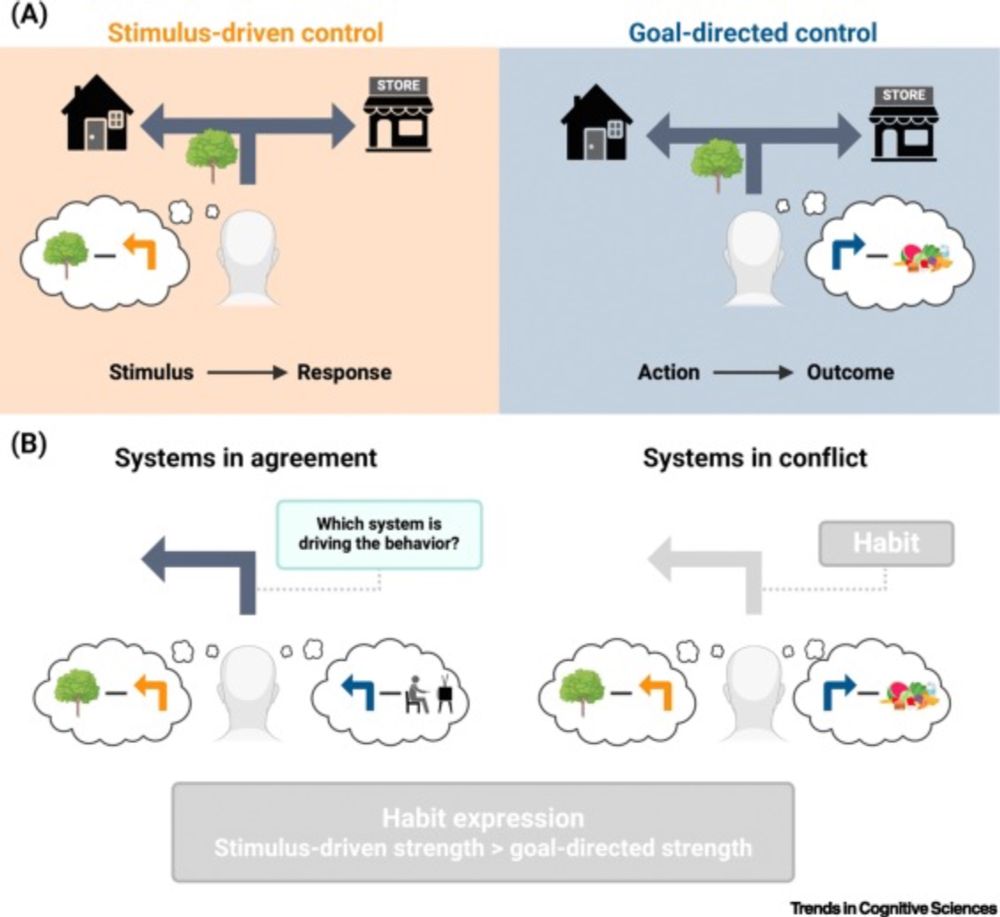Kelly Donegan
@kellydonegan.bsky.social
Cognitive & Mental Health Researcher 🧠
Post-doc @ University of York | PhD @ Trinity College Dublin
➡️ https://sites.google.com/view/kellyrdonegan
Post-doc @ University of York | PhD @ Trinity College Dublin
➡️ https://sites.google.com/view/kellyrdonegan
Reposted by Kelly Donegan
This article is now published in @plosone.org. journals.plos.org/plosone/arti... New analysis added: seemingly habitual responses are explained because contingency deg didn't work for some participants (in line with recent outcome dev results in our lab and in @clairegillan.bsky.social lab)

The degraded contingency test fails to detect habit induction in humans
In experimental psychology and behavioral neuroscience, habits are considered stimulus-response (S-R) associations formed through extended reward training. Accordingly, habits are assessed using one o...
journals.plos.org
October 16, 2025 at 7:31 AM
This article is now published in @plosone.org. journals.plos.org/plosone/arti... New analysis added: seemingly habitual responses are explained because contingency deg didn't work for some participants (in line with recent outcome dev results in our lab and in @clairegillan.bsky.social lab)
Reposted by Kelly Donegan
Taken together, our results advance our understanding of the dynamics of fun in realistic environments. They also emphasize the importance of using realistic, game-like environments together with highly-controlled experiments to advance our theories of human motivation & learning.
4/4
4/4
October 2, 2025 at 9:32 AM
Taken together, our results advance our understanding of the dynamics of fun in realistic environments. They also emphasize the importance of using realistic, game-like environments together with highly-controlled experiments to advance our theories of human motivation & learning.
4/4
4/4
Congrats Ondrej & failte to Eire ☘️
September 24, 2025 at 7:08 PM
Congrats Ondrej & failte to Eire ☘️
Finally, a big shoutout to @adrianhaith.bsky.social, @yuedu.bsky.social, Robert Hardwick & co for inspiring this work & the game! 🌟
Happy reading! 🤓☕
Happy reading! 🤓☕
July 28, 2025 at 1:53 PM
Finally, a big shoutout to @adrianhaith.bsky.social, @yuedu.bsky.social, Robert Hardwick & co for inspiring this work & the game! 🌟
Happy reading! 🤓☕
Happy reading! 🤓☕
The good news? If there’s more than one mechanism driving compulsive behaviour, there’s likely more than one way to intervene! We talk about this in our @cp-trendscognsci.bsky.social review @eikekofi.bsky.social @parnianrafei.bsky.social
www.cell.com/trends/cogni...
www.cell.com/trends/cogni...

Leveraging cognitive neuroscience for making and breaking real-world habits
Habits are the behavioral output of two brain systems. A stimulus–response (S–R) system
that encourages us to efficiently repeat well-practiced actions in familiar settings,
and a goal-directed system...
www.cell.com
July 28, 2025 at 1:53 PM
The good news? If there’s more than one mechanism driving compulsive behaviour, there’s likely more than one way to intervene! We talk about this in our @cp-trendscognsci.bsky.social review @eikekofi.bsky.social @parnianrafei.bsky.social
www.cell.com/trends/cogni...
www.cell.com/trends/cogni...
People higher in compulsivity made the most habit errors - suggesting stronger habit formation 🏋️♀️
… but so did younger adults, men & those with more education! Because habits aren’t 'bad'. They’re efficient ✅. Until they're not 🚧.
… but so did younger adults, men & those with more education! Because habits aren’t 'bad'. They’re efficient ✅. Until they're not 🚧.

July 28, 2025 at 1:53 PM
People higher in compulsivity made the most habit errors - suggesting stronger habit formation 🏋️♀️
… but so did younger adults, men & those with more education! Because habits aren’t 'bad'. They’re efficient ✅. Until they're not 🚧.
… but so did younger adults, men & those with more education! Because habits aren’t 'bad'. They’re efficient ✅. Until they're not 🚧.
Similar to the lab-based version, we found more habits following extended training. And this effect was time-dependent ⏱️, with habits being revealed when you have to act fast
www.nature.com/articles/s41...
www.nature.com/articles/s41...

Time-dependent competition between goal-directed and habitual response preparation - Nature Human Behaviour
Hardwick et al. show that habits in human behaviour consist of automatic preparation of an action in response to a trigger. Even though we can learn to control habits to perform different action respo...
www.nature.com
July 28, 2025 at 1:53 PM
Similar to the lab-based version, we found more habits following extended training. And this effect was time-dependent ⏱️, with habits being revealed when you have to act fast
www.nature.com/articles/s41...
www.nature.com/articles/s41...
Introducing ... 🥁🥁🥁... COGQUEST
July 28, 2025 at 1:53 PM
Introducing ... 🥁🥁🥁... COGQUEST
Training habits = lots of trials + multiple in-lab visits. Burdensome & inaccessible 🥱🚫 That’s why we gamified a habit task via @clairegillan.bsky.social's Neureka app
1000 people trained habits over a week, while also reporting on their mental health. All without stepping foot inside the lab!
1000 people trained habits over a week, while also reporting on their mental health. All without stepping foot inside the lab!

July 28, 2025 at 1:53 PM
Training habits = lots of trials + multiple in-lab visits. Burdensome & inaccessible 🥱🚫 That’s why we gamified a habit task via @clairegillan.bsky.social's Neureka app
1000 people trained habits over a week, while also reporting on their mental health. All without stepping foot inside the lab!
1000 people trained habits over a week, while also reporting on their mental health. All without stepping foot inside the lab!
Reposted by Kelly Donegan
What does this tell us? At least some of the implicit assumptions when advocating for the use of computational models in psychiatry are not met for these popular tasks and computational models -> limiting utility.
July 10, 2025 at 11:07 AM
What does this tell us? At least some of the implicit assumptions when advocating for the use of computational models in psychiatry are not met for these popular tasks and computational models -> limiting utility.

